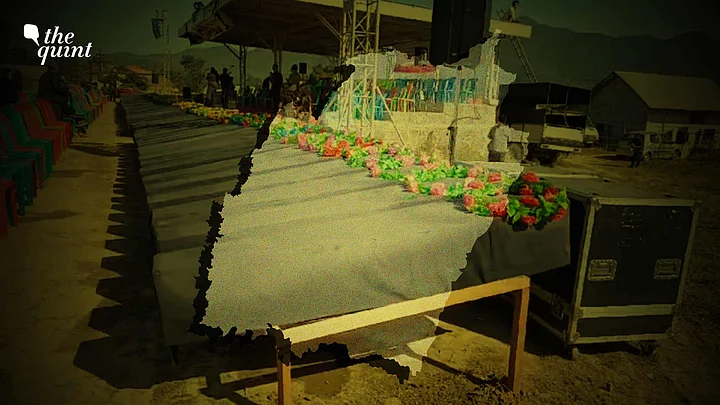If one has learned anything at all from the ongoing political turmoil in Manipur, it is the political relevance imbued on dead bodies in zones of conflict – for individuals, communities, and the state.
After eight months of the Manipur violence, 60 estranged bodies lying in two mortuaries in Imphal were finally reunited with their families. They were airlifted to the Kuki-Zo-dominated hill districts of Kangpokpi and Churachandpur on 14 December.
This was made possible due to the joint efforts made by the IGAR South, and 22 Assam Rifles after the Supreme Court directed the state government to arrange for dignified burials.
The decision for the relocation of the mortal remains of their kin was welcomed by the victims’ families who had almost given up the hope of retrieving them.
A Much-Needed Closure for the Grieving Families
With the Meitei-dominated areas of the Imphal valley turning into a no-go zone for Kuki-Zo tribals and vice versa, families on either side of the divide had not been able to collect the remains of their kin for long.
On 15 December, a mass burial ceremony marked by a day of mourning, a gun salute by village volunteers, and a total shutdown of all business activities were observed as a mark of respect to the deceased in Kangpokpi district.
The list of bodies that were solemnly buried with honour in Phaijang Village of Kangpokpi district includes the bodies of two young women who were brutally lynched by alleged Meitei mobs on 4 May in Imphal.
One's mother had told The Quint on 25 October that she could not come to terms with her daughter’s death because she had not seen her body.
With the 'dead bodies’ reuniting with their kin, they are now understood as 'actual persons with identities and families’, accepted, honoured, and buried by the Kuki-Zo community as 'martyrs’.
The grieving families could finally attain some sort of closure though healing would require both time and justice.
Similarly, in Churachandpur district, 87 Kuki-Zo victims of ethnic violence that include the 41 that were airlifted and a one-month-old baby, were laid to rest in a dignified burial ceremony at Sehken village on 20 December.
Mourning and sadness engulfed the air, only to be disrupted by performative gunshots by village volunteers as a mark of respect to the deceased. The heart-wrenching video of a mother weeping inconsolably over her son’s coffin, and bringing a parting gift of a pair of slippers, a tracksuit, and a biscuit had become viral the same day.
Laying the Dead To Rest 'Where They Belonged’
The Kuki-Zo communities have always followed specific religious and cultural prescriptions for the societal management of the deceased bodies to ensure their safe passageways to the 'afterlife’ or the ‘abode of the dead’ – the geopolitical location of the burial site being one of them.
Albert Vaiphei’s father died of a stroke while they were fleeing from an enraged mob on 4 May. He carried his father’s dead body 17 kilometres uphill, and spent a night in a jungle, in order to return to his ancestral village ie, Salam Patong that was already ravaged and there he buried his father complying with the religious and customary directives.
He laid him to rest in his own village as that is 'where he belongs,’ and not in the jungle or in another village’s cemetery.
Each of these lifeless bodies had stories to tell, about their own lives and the atrocities they faced which went with them. A mass burial is necessitated when a dead body cannot be meaningful in itself. It becomes meaningful only through culturally established relations to death.
They also remind the 'living’ to be united and steadfast in their quest for freedom from an oppressive administration.
False Claims Made of Ethnic Minorities As 'Infiltrators’
Many of those buried were killed in the initial days of the conflict, in and around Imphal Valley by radicalised mobs, suggesting that the timely intervention of the authorities could have not only saved lives but also prevented the scale and escalation of the violence.
Secondly, all 60 bodies of the Kuki-Zo community that were delivered by the Assam Rifles were identified and their details inscribed on coffins.
None of them turned out to be 'infiltrators' as was alleged and did not pose any threat to national security.
As ethnic minorities in Manipur, the present political imbroglio require them to constantly prove their indigenous origin, citing their participation in the Indian National Army in the 1940s and in the Kuki Uprising against the colonial Britishers in 1917-1919.
As much as the efforts made by the Indian government at facilitating a decent burial is appreciated, it is equally important that they undergo a ‘social image’ restoration.
Article 21 of the Constitution should also be imbibed that allows a decent obituary that publicly acknowledges them as legitimate Indian citizens. As Brahma Prakash, a JNU professor, had said: "The right to have dignity in death is perhaps one of the last virtues of humanity. It is the last act of caring."
(Hoineilhing Sitlhou is an Assistant Professor at the Department of Sociology, University of Hyderabad. This is an opinion piece and the views expressed are the author's own. The Quint neither endorses nor is responsible for them.)
